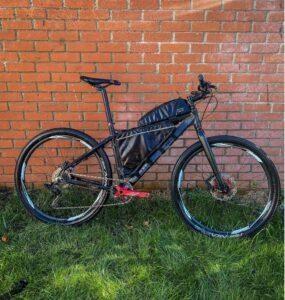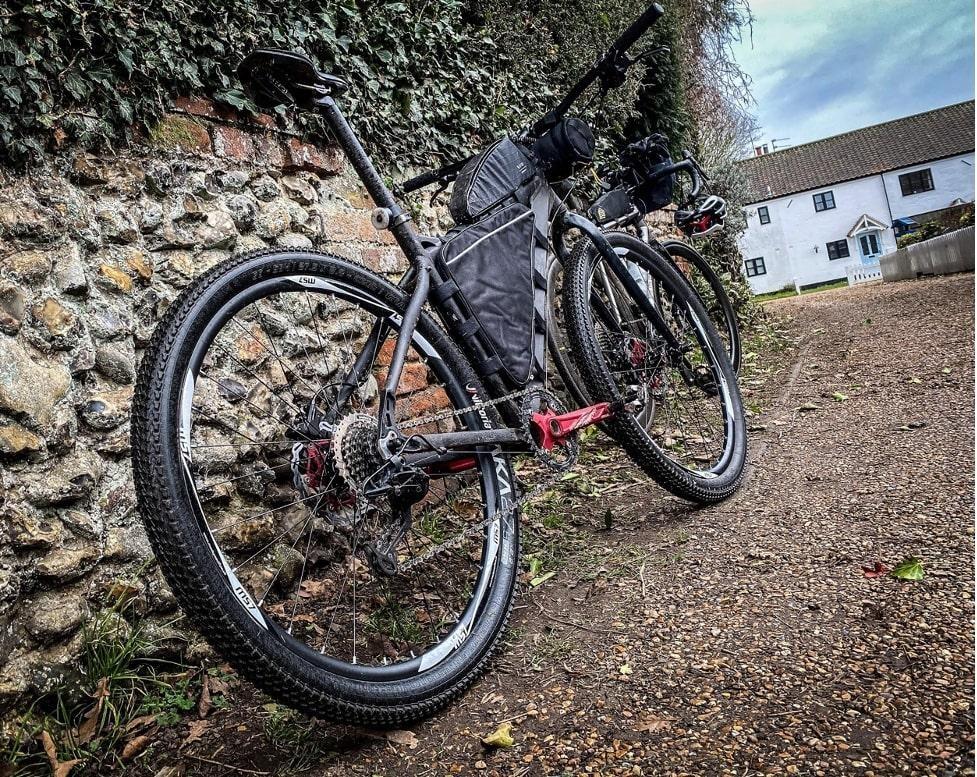Key Takeaways: Rigid mountain bikes, which have standard forks instead of suspension, offer advantages like being lighter, cheaper, and faster on smooth terrain with minimal maintenance, but they are less efficient and comfortable off-road and can alter the bike’s geometry.
While suitable for light gravel and road riding, they are less ideal for technical trails compared to suspension mountain bikes.
Introduction
When it comes to cycling, you can have a lot of fun, especially off-road. Having a mountain bike and ripping round trails is endless hours of fun.
However, mountain bikes can be expensive, especially top-end bikes and high-end forks. Many cyclists take to either buying a rigid mountain bike or swapping out their forks for rigid forks.
What is a Rigid MTB?
A rigid mountain bike is a bike where instead of having suspension, you just have standard forks instead. In this article, we will speak about rigid forks and the advantages and disadvantages of using them.
Then as a cyclist who has used both, I am going to tell you all about what it’s like to ride with them.
Advantages
They are much lighter
The first thing to mention is that a set of rigid forks are much lighter than suspension forks. Roughly suspension forks weigh 1.5kg, and a set of rigid carbon forks can be as little as 500 grams. So that’s a considerable weight saving of about a kilo.
They are cheaper
As far as rigid forks go, they are very cheap. As far as it goes for buying them, they are about a third of the cost of a suspension fork.
A set of rigid forks is as cheap as $80 and as costly as $400. By all means, they are not expensive and straightforward to fit.
They are faster on the Road
Rigid forks are much lighter and stiffer. This typically makes them much better on the road when it comes to going faster on smooth terrain.
You lose a lot less momentum when accelerating and slowing down and can really drive the power into them.
Cost nothing to maintain
 Suspension forks typically cost a lot to maintain with needing small services as often as every 50 hours of use.
Suspension forks typically cost a lot to maintain with needing small services as often as every 50 hours of use.
Then the more significant services less frequently they need to be sent away for.
This is time consuming and does cost money for part.
With rigid forks, you don’t need to maintain and service them, which is a significant saving of time and money.
Disadvantages
Off-road, they are not very efficient
When it comes to going off-road, having suspension goes a very long way. It helps the bike roll over obstacles, and it helps the rebound of the bike. You find a rigid bike won’t be anywhere near as fast on technical terrain when going off-road.
They are very uncomfortable off-road
Then we have the next issue, comfort. Rigid mountain bikes on the road are excellent, but you can really feel everything you hit off-road.
It does make riding off-road much more challenging, and if you are looking to be on trails all day can have a very negative effect on your hands and the whole body.
A Suspension Fork can do the same thing as a Rigid Fork
Typically a lot of suspension forks come with a lockout. This is where you can disable the suspension with a switch on the top of the handlebars. This makes them rigid, and you get the same benefits without the weight saving.
People tend not to have much interest in them
When it comes to resale, not a vast amount of cyclists have much interest in rigid mountain bikes. This can make it challenging when saving for a new bike as they are just not very sort after in resale.
They change the Geometry
 Unfortunately, with rigid forks, they often don’t have the same rake or height as a suspension fork, and this causes the geometry to change.
Unfortunately, with rigid forks, they often don’t have the same rake or height as a suspension fork, and this causes the geometry to change.
You could find yourself on a very aggressive bike if you go to rigid forks.
What’s it like riding a Rigid Mountain Bike?
When you first get a rigid mountain bike or change your forks over, you find that the bike will feel much lighter.
Then you first take it out on the road, and it feels very responsive and very fast, and you can feel a huge benefit to making the change. The average speed will probably be higher, and for city commutes, it’s ideal.
Then you try them off-road, and it’s a totally different experience. If you’re on light gravel or smooth trails, they are not too bad, but the difference is enormous when it comes to rough terrain.
They become really hard on your hands, and also, you just don’t have the agileness that you get with suspension. I also found that the bike always felt like it was fighting back against me when I came to going over obstacles.
I also found the bike to feel very aggressive as the forks that I had purchased were much smaller, and I had to lean over much more, which actually made the bike a little more uncomfortable for me on the longer rides.
Example of a Rigid MTB: On-One Whippet SRAM GX Mountain Bike
Is a Rigid Mountain Bike for me?
If you do a lot of light gravel, smooth trails, and roads, then they make a huge difference, and it does improve the quality and the speed of your riding.
I would highly recommend getting a rigid mountain bike and saving money on maintenance and the cost of the bike.
If you are planning on epic trails, the suspension is just so much better, and I found when timing myself on a challenging trail, I was just so much faster with the suspension forks when it came to very rough terrain and getting over rocks and tree roots.
If you’re looking at lots of off-road riding, a suspension mountain bike is for you.

Robbie Ferri has spent years working in a bike shop, has worked with industry leading brands on product creation, has been a semi pro athlete, and is a fully qualified strength and conditioning coach. He has broken World Records, bikepacked all over the World and raced ultra distance at a top-level.






Thanks Robbie a very good comparison to help differentiate the advantages and disadvantages between the two options.
Rigid MTBs are brilliant on uphills. You can stand out of the saddle and tear up an incline without power from your pedal strokes being siphoned off through suspension bob